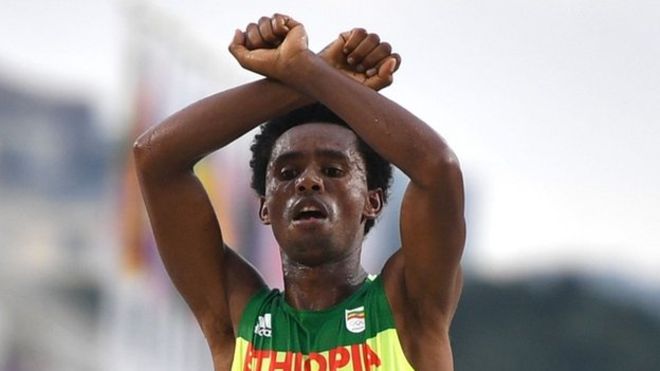Ethiopian Diaspora Raises Over $100K to Help Protesting Olympic Athlete

Ethiopian distance runner Feyisa Lilesa, a silver medal winner at the Rio Olympics, made headlines around the world when he crossed his wrists above his head, making a symbol that has become the rallying cry for protests in the Oromia region of Ethiopia.
That political gesture put the runner at grave personal risk, and now some in the Ethiopian diaspora want to help him.
Solomon Ungashe of California is one of the three people who co-sponsored a gofundme account for the runner. Gofundme is an online crowdsourcing platform used to raise money for charitable and personal campaigns.
Ungashe told VOA the athlete didn’t initiate it or ask people to help him, but supporters figured it was necessary and, through the account, they have been able to raise more than $100,000 so far. Separately, they have sent three people who paid out-of-pocket to fly to Rio and provide support.
“Feyisa did what he did to raise the bigger issue, but again he left everything that he has. This man is a person who apparently lives a comfortable life at home in Ethiopia, and he left all that behind,” Ungashe said.
Ungashe added that the money may be used to pay for an immigration lawyer to help the runner get a visa, as well as to facilitate his move to a new country. Ungashe hopes the runner will choose to resettle in the U.S.
What’s next
The silver medalist is now thinking about what is next for him and his family. He said he didn’t celebrate much after crossing the finish line because some of his friends are in prison and some are dead.
Government spokesman Getachew Reda, however, downplayed his concerns, saying the country plans a “heroic welcome” for him and his safety was guaranteed. Reda told a state-affiliated news channel that Lilesa will not face any problems for his political stance.
“After all, this is an athlete who secured a silver medal for his country,” he said, speaking to Fana Broadcasting Corporation.
Skeptical of safety
Henok Gabisa, a visiting academic fellow at Washington and Lee University School of Law in Lexington, Virginia, said there is reason to doubt the government. He noted that the state-owned TV station in Ethiopia took pains not to show Lilesa’s gesture during its Olympic coverage.
Gabisa does not believe the government statement assuring Lilesa’s safety can be trusted. “People who were killed, more than 500 Oromos and Amhara people who were killed, and maimed and imprisoned for showing the same gesture are still being killed. What unique reason do we have that Feyisa is not going to face the same predicament?” he told VOA.
Ungashe shares similar concerns. He noted that after the government spokesman made the statement, the Oromia regional administration branch of the government — the Oromo People’s Democratic Organization (OPDO), a group that supports the national government — used its website to accuse Lilesa of being used by “terrorists, by enemies of peace and enemies of development.”
“So who do you believe?” Ungashe said.
VOA